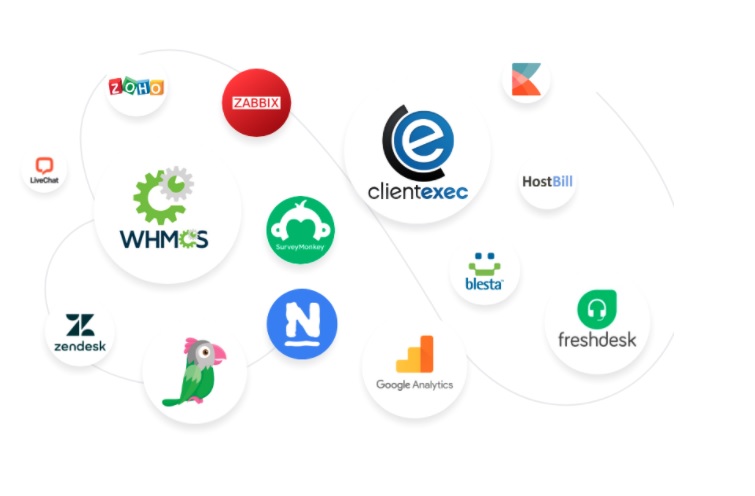
Web Hosting is a huge and growing market. As per Global Industry Analysts-2021, it is predicted that the web hosting market would reach $267.10 billion by 2028. Also, the large 10 players control 24% of the total market and small and medium-sized companies contribute the remaining. There is huge potential for web hosting startups to mushroom and grow.
Running a web hosting company will need to finalize the software stack that you plan to use for different functions. Let’s first start with the functions that you need to handle while running the hosting company.
Popular Software Stack for running a Hosting company
- Web Hosting Panel: It’s the web panel your hosting user will use to manage his/her webspace. So decide on the web hosting panel you would like to offer to your customers. Depending on the market you plan to cater to, you could choose the web hosting panel. Some of the most popular web hosting panels in the industry are cPanel, Plesk, DirectAdmin, DotNetPanel, VirtualMin/Webmin, etc. You can read about the hosting panel here.
- Billing & Automation Tool: It’s the most important tool that your business will require to manage your customer’s billing and products. Some of the most popular tools in this space are WHMCS, ClientExec, HostBill, Blesta, Boxbilling, WiseCP, BillingServ, etc. Though there are many players in this space, the majority of the market share is held by WHMCS. It is a simple and easy-to-use billing automation tool.
- Support Tools: Support Tools are any application that helps with customer support requests. The Majority of web hosts offer support through channels like helpdesk and chat. So let me give you an idea of the common tools used for helpdesk as well as chat support.
- Helpdesk Software: Helpdesk Software is an application that helps to manage and respond to customer email. Some of the most popular helpdesk tools are ZenDesk, FreshDesk, Kayako, WHMCS helpdesk, Jira Service Desk, Vision Helpdesk, SupportPal, InterCom, Zoho Desk, OTRS, etc. Choose the one that meets your budget and features.
- Chat Tools: Chat Tools is an application that helps to offer support through chat from your website. Some of the most common tools used in the web hosting industry are LiveChat, Olark, Liveagent, Freshchat, WHMCS live chat, Twak.to, HubSpot Live chat, PureChat etc. Take a look at all these tools and choose the one that meets your budget and features.
- Server Monitoring Tool: While running a hosting business, you will need to monitor the servers you run as your downtime will kill your brand and customer confidence. So keeping the service always online is critical. Monitoring tools help you to be on top of things and act quickly when an alert is generated. The most popular tools used in the hosting market are – Nagios, Zabbix, Pingdom, Uptime Robot, New Relic, DataDog, Logic Monitor, SolarWinds, etc.
- Domain Registrars: To offer domain names to your customers, you will need to have a tie-up with domain name registrars. Some of the popular domain name registrars are Enom, ResellerClub, InternetBS, Hexonet, etc. Choose the one that has modules or plugins for the billing and automation tool you choose to go ahead with. If you decide to go with WHMCS then registrars like Enom, InternetBS, and Hexonet have great integrations with WHMCS. So choose the one that fits your main tools.
- Hosting Business Website: To create traffic and interest in customers, you will need to create a website listing all your services and hosting packages. To do this, you could use CMS(s) like WordPress, Joomla, Drupal and even create a custom website. But do make sure to integrate the billing and hosting automation tools(i.e WHMCS, ClientExec, Hostbill, Blesta etc)
- Hosting Agreements: You will need to work with a lawyer and create Terms of Service & Privacy policy. There are many online legal firms as well like websitepolicies, LegalZoom, etc. Choose the one that has good reviews and fits your budget.
- Social Media Pages/Handles: Create social media handles on a platform where your customers frequent. To sell web hosting business social media platforms like Facebook, Twitter, Instagram, etc. are good. Also, create a user handle to interact with your users on the most popular web hosting platforms like WHT aka web hosting talk & LowEnd talk.
If you have slightly larger capital in the beginning then you could also consider CRM(s) like SalesFroce, Freshworks, Zoho, HubSpot, or SugarCRM (i.e has free edition).
Once you have met all the requirements listed above, you will be good to go with your hosting business. Hope this article helps you get started and running a web hosting company.

